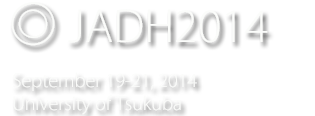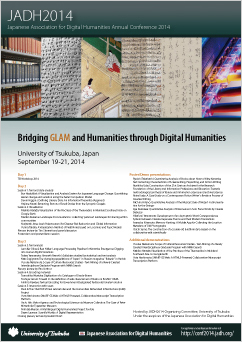Call for Papers (CLOSED)
JADH2014: Call for Papers
"Bridging GLAM and Humanities through Digital Humanities"
The deadline has been extended to 11:59PM (JST), 22 May 2014.
The Japanese Association for Digital Humanities is pleased to announce its fourth annual conference, to be held at University of Tsukuba, Ibaraki, Japan, September 19-21, 2014.
http://conf2014.jadh.org/
The conference will feature posters, papers and panels. We invite proposals on all aspects of digital humanities globally, and especially encourage papers treating topics that deal with practices that aim to go beyond borders, for example, between academic fields, media, languages, cultures, and so on, as related to the field of digital humanities.
GLAM (Galleries, Libraries, Archives, and Museums) have played prominent roles in the recent rapid evolution of the humanities in the digital environment. In this decade, digital methods have been illuminating new possibilities of their relationships. At JADH2014 we will be especially interested in hearing presentations that focus on these methodologies and practice in GLAM, but we nonetheless welcome papers on a broad range of DH topics.
Proposals may deal with the following aspects of digital humanities:
Research issues, including data mining, information design and modeling, software studies, and humanities research enabled through the digital medium; computer-based research and computer applications in literary, linguistic, cultural and historical studies, including electronic literature, public humanities, and interdisciplinary aspects of modern scholarship. Some examples might include text analysis, corpora, corpus linguistics, language processing, language learning, and endangered languages; the digital arts, architecture, music, film, theater, new media and related areas; the creation and curation of humanities digital resources; the role of digital humanities in academic curricula;
The range of topics covered by Digital Humanities can also be consulted in the journal
LLC: the Journal of Digital Scholarship in the Humanities, Oxford University Press.
The deadline for submission of abstracts is 7 May 2014. Presenters will be notified of acceptance on 30 May 2014.
Abstracts should be of approximately 500 words in length in English, including title. The following information should clearly be stated (in either an attached file, or the email body):
1. The type of presentation (poster, short paper, long paper or panel)
2. Title
3. A list of keywords (up to five)
4. The name, status and affiliation of the presenter (s)
5. Contact email address
6. Postal address
7. A career description of no more than 100 words
* Abstract should not include above information--except for the title.
Please send abstracts to conf2014 [ at ] jadh.org by 7 May 2014.
Type of proposals:
1. Poster presentations
Poster presentations may include work-in-progress on any of the topics described above as well as demonstrations of computer technology, software and digital projects. A separate poster session will open the conference, during which time presenters should be on-hand to explain their work, share their ideas with other delegates, and answer questions. Posters will also be on displayed at various times during the conference, and presenters are encouraged to provide material and handouts with more detailed information and URLs.
2. Short papers
Short papers are allocated 10 minutes (plus 5 minutes for questions) and are suitable for describing work-in-progress and reporting on shorter experiments and software and tools in early stages of development.
3. Long papers
Long papers are allocated 20 minutes (plus 10 minutes for questions) and are intended for presenting substantial unpublished research and reporting on significant new digital resources or methodologies.
4. Panels
Panels (90 minutes) are comprised of either:
(a) Three long papers on a joint theme. All abstracts should be submitted together with a statement, of approximately 500 words, outlining the session topic and its relevance to current directions in the digital humanities; or
(b) A panel of four to six speakers. The panel organize should submit a 500-words outline of the topic session and its relevance to current directions in the digital humanities as well as an indication from all speakers of their willingness to participate.
Contact:
Please direct enquires about any aspect of the conference to:
conf2014 [ at ] jadh.org
Program Committee:
Hiroyuki Akama (Tokyo Institute of Technology, Japan)
Paul Arthur (Australian National University, Australia)
James Cummings (University of Oxford, UK)
Neil Fraistat (University of Maryland, USA)
Shoichiro Hara (Kyoto University, Japan)
Jieh Hsiang (National Taiwan University, Taiwan)
Mitsuyuki Inaba (Ritsumeikan University, Japan)
Charles Muller (University of Tokyo, Japan)
Hajime Murai (Tokyo Institute of Technology, Japan)
Maki Miyake (Osaka University, Japan)
Kiyonori Nagasaki (International Institute for Digital Humanities, Japan)
John Nerbonne (University of Groningen, Netherlands)
Espen Ore (University of Oslo, Norway)
Elena Pierazzo (King’s College London, UK)
Geoffrey Rockwell (University of Alberta, Canada)
Susan Schreibman (National University of Ireland Maynooth, Ireland)
Masahiro Shimoda (University of Tokyo, Japan)
Raymond Siemens (University of Victoria, Canada)
Takafumi Suzuki (Toyo University, Japan)
Tomoji Tabata (Osaka University, Japan), Chair
Norihiko Uda (University of Tsukuba, Japan)
Christian Wittern (Kyoto University, Japan)
Taizo Yamada (University of Tokyo, Japan)

